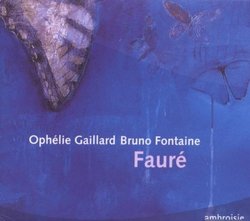| All Artists: G. Faure, Ophelie Gaillard, Bruno Fontaine Title: Fauré: Works for Cello & Piano Members Wishing: 1 Total Copies: 0 Label: Naive Original Release Date: 1/1/2008 Re-Release Date: 2/26/2008 Genres: Dance & Electronic, Pop, Classical Styles: Vocal Pop, Chamber Music, Forms & Genres, Concertos, Historical Periods, Classical (c.1770-1830), Modern, 20th, & 21st Century, Instruments, Strings Number of Discs: 1 SwapaCD Credits: 1 UPC: 822186001301 |
Search - G. Faure, Ophelie Gaillard, Bruno Fontaine :: Fauré: Works for Cello & Piano
 | G. Faure, Ophelie Gaillard, Bruno Fontaine Fauré: Works for Cello & Piano Genres: Dance & Electronic, Pop, Classical |
Larger Image |
CD Details |
CD ReviewsLe Parfum impérissable J Scott Morrison | Middlebury VT, USA | 05/18/2008 (5 out of 5 stars) "Fauré's musical fingerprints are so uniquely his that one can identify music as being by him even when one has never heard a particular piece before. Such was the case with the works on this CD of cello-and-piano music. One day I turned on the radio and heard the second movement of his First Sonata and knew immediately, although I'd never heard it before, that 'this has to be Fauré.' I listened through to the end of the sonata and realized that I wanted to own this CD by Ophélie Gaillard, cello, and Bruno Fontaine, piano. The disc contains both cello/piano sonatas and several of his salon pieces for cello with piano accompaniment. Indeed, it contains almost all of Fauré's music for this combination; the only thing missing is his Sérénade written for Casals. But it does include Casals' own arrangement of Fauré's beloved song 'Aprés un rêve.' The First Sonata was written during the last year of World War I. The first movement is agitated and angular, the second is a meditative Andante whose melodic construction is vrai Fauré with long sinuous melodic tendrils that go on for paragraphs. The finale, written some months after the first two movements and when it appeared the war might be soon over, has the cello calm and reflective, generous in melodic warmth, while the piano accompaniment is, to borrow Eric Blom's word, murmuringly 'semiquaverish'. The Second Sonata, written in 1921 when Fauré was in his mid-seventies, evokes both calm and turbulent waters. The second movement was originally written as an occasional piece, 'Chant funéraire', used for the national French commemoration of the 100th anniversary of Napoleon's death. It is similar in feeling to that of 'Élégie', the piece that is heard first on this CD: tenderness, gentleness, regret, resignation. The finale is a joyous conclusion to one of Fauré's greatest late chamber works. Among the salon pieces are 'Élégie', described above, the melancholy 'Romance', the fluttering 'Papillon', the antique 'Sicilienne' (arranged from Fauré's orchestral 'Pelléas et Mélisande' suite) and the gloriously radiant 'Aprés un rêve.' All these, as well as the sonatas, are played with grace and substance by Gaillard and Fontaine. It is of note that Gaillard plays an 1852 French cello made by Auguste Sebastien Philippe Bernardel ('Bernardel Père'), the sound of whose instruments must surely have been familiar to Fauré. Fontaine's piano is an exceedingly well-regulated modern Steinway. Recommended for lovers of this literature and of cello/piano music in general. Scott Morrison" Rosettes, Velvet, Antimacassars, Ferns ... Giordano Bruno | Wherever I am, I am. | 09/11/2009 (5 out of 5 stars) "... and all the faded furnishings of my great-grandmother's salon. That's what I've been prone to associate with the music of Gabriel Fauré (1845-1924) and his contemporaries, especially his French contemporaries. In short, I've ignored him, even avoided him. I'm somewhat shame-faced to declare that I was unfair, though in my defense I have to say that there's a lot of music in the world, whole realms of music available to us, both performers and listeners, these days, and you can't hear it all.
I try to avoid reviewing music that I haven't performed myself, or at least heard often. This review will be an exception. I've never looked at a Fauré score or played a Fauré piece. Honestly, i'd never heard any of the pieces on this CD except the 'classical radio' favorite Sicilienne, adapted from Fauré's orchestral suite Pelleas et Melisande. Would it be presumptuous to suppose that many music lovers are as unfamiliar with the two sonatas for cello and piano as I have been? That Sicilienne has a haunting melodic beauty, but it isn't entirely characteristic of Fauré's chamber music. You might say it's "Fauré Lite", a far simpler and less challenging-to-hear composition than anything else on this CD. The two sonatas are dark intellectual beauties, intricate in counterpoint, subtle in harmonic modulation, less 'immediate' than the Sicilienne but more rewarding for repeated listenings. Ordinarily a reviewer would be expected to offer some comparisons of the performance with other recorded performances. That I can't do. This is the only performance of these works that I've ever heard in any format. I was attracted to this CD, however, by the performer, cellist Ophélie Gaillard, whose recordings of cello works by Bach and Boccherini have "blown me away". For what it's worth, my impression is that she plays these Fauré pieces with total musicality, so that I'm 'convinced' by her interpretation. Her technique and her specific historical instrument are as different as night from day on this CD, compared with her glorious Boccherini. That is exactly how it should be. Pianist Bruno Fontaine is far more than an accompanist in this music; one of its beauties is the intricate intertwining partnership of the so-unlike timbres of the bowed strings and the hammered strings. The previous reviewer, Mr. Morrison, has offered the perspective of a Fauré connoisseur. He also gives this CD five stars." |
